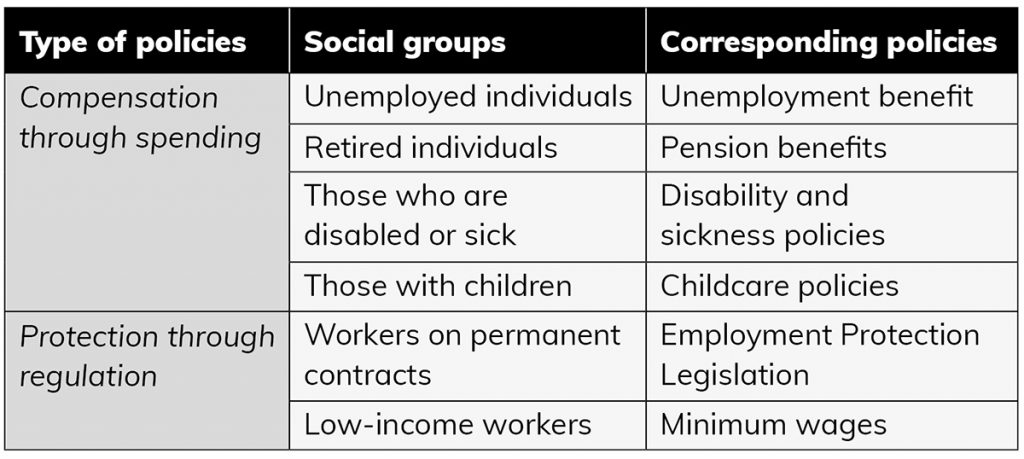Societal risks create favourable conditions for far-right parties, who turn discontent into political advantage. Welfare state policies, argue Daphne Halikiopoulou and Tim Vlandas, moderate these risks and reduce the likelihood of insecure people voting far right
Deteriorating economic performance and relative deprivation can act as drivers for far-right party support. 'Left-behind' individuals such as the unemployed and low-income workers, as well people on more comfortable incomes, may experience insecurity and are therefore latent or potential far-right voters.
The perception that people are directly competing with immigrants for scarce jobs is also likely to boost far-right support.
Far-right parties have been effective in mobilising support among insecure populations. Their recent success has been based on proposing solutions distinct from their older market liberal stances.
The perception that people are directly competing with immigrants for scarce jobs is also likely to boost far-right support
The ‘welfarist turn’ in far-right party positions makes such parties appear credible to deal with rising unemployment and economic hardship. This ‘normalisation’ strategy allows far-right parties to appeal beyond their secure voting base to a range of insecure groups. These groups include traditionally left-voting working class people, and more educated people who suffer from relative, if not absolute, deprivation.
Insecurities, however, are not static. Welfare state policies can moderate the outcomes of both objective and subjective insecurity in two ways.
First, they can compensate workers after the realisation of a particular set of risks. For instance, they can provide replacement income when someone becomes unemployed.
Second, they can protect workers from the risks being realised in the first place. They can make it harder, for example, for employers to dismiss workers.
welfare policies can allay grievances that would otherwise influence people to vote for parties of the far right
This distinction between compensatory spending policies such as unemployment and retirement benefits, and protective regulatory policies such as minimum wage and employment protection legislation, helps us make the link between welfare state policies, insecurity, and far-right party support.
Welfare policies can lower the costs and risks associated with belonging to a particular social group. By so doing, they allay grievances that would otherwise influence people to vote for parties of the far right.
The degree to which particular social policies reduce people's insecurity depends on the type of social risks these individuals face. People in distinct social groups experience different problems in the market and are exposed to varying degrees of economic risk.
For example, job insecurity is linked to contract type. Temporary workers experience higher levels of job insecurity than workers on permanent contracts. Only the latter are protected by employment protection legislation.
Drawing on this logic, our research distinguishes between risk groups, and identifies policies that may compensate or protect individuals facing these risks. Specifically, we conceptualise different types of non-mutually exclusive risks that individuals may face.
In a loose, non-exclusive sense, we identify six groups who share a characteristic that exposes them to a particular social risk. Our six risk groups are the unemployed, pensioners, those who are permanently sick or disabled, low-income workers, workers on permanent contracts, and people with children.

To understand the effect of welfare state policies on far-right party support, we merged data from seven waves (2002–2016) of the European Social Survey with national-level welfare state policy datasets. Our analysis includes 19 far-right parties in 14 European countries.
Our findings confirm that welfare state policies reduce far-right support among individuals exposed to high social risks through either a compensation or a protection mechanism.
In terms of compensation, certain groups are less likely to support the far right when the relevant policies are generous. These groups include unemployed individuals, pensioners, disabled and long-term sick individuals, and those in large families.
In terms of protection, permanent workers are less likely to vote for far-right parties when employment protection legislation is more protective and reduces their (perceived) fear of losing their job. The probability of voting for the far right is also lower for low-income individuals in countries with minimum wage provisions.
In sum, we find that the generosity of policies addressing at-risk groups' needs influences far-right support among these groups. This speaks to the debate on whether socio-economic risks matter for voting behaviour and if so, how.
Welfare state policies are an effective deterrent of far-right support, not only for the most vulnerable, but among a broad range of distinct social groups. Thus, they prevent the far right from forging voter alliances and extending support beyond its secure voting base.
the generosity of policies addressing at-risk groups' needs influences far-right support among these groups
The economic risks voters face do not always translate into far-right voting. Societal anxieties alone are not enough to explain why insecure people are more likely to vote for far-right parties. If we are right, the answer also lies in policies. Governments can play a significant role in containing the rise of far-right parties by implementing policies that protect and compensate the insecure.
This blog is based on Daphne and Tim's West European Politics article Welfare state policies and far-right party support: moderating ‘insecurity effects' among different social groups